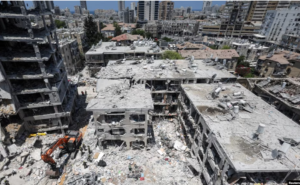
According to preliminary information from the Ukrainian Embassy in Israel, on June 14, as a result of a massive missile attack by Iran against Israel and a missile hitting a residential building in Bat Yam, five Ukrainian citizens were killed, including three minors, the Ukrainian Foreign Ministry reported.
According to the ministry, the identities of the victims are currently being established.
Ukrainian diplomats and consuls are in close contact with the Israeli police and other services to identify and organize the repatriation of the bodies of the victims.
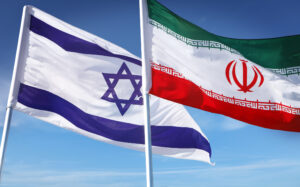
Comparative analysis of the economies of Israel and Iran
| Indicator | Iran | Israel |
| GDP | ~$400 billion | ~$540 billion |
| GDP per capita | ~$4 400 | ~$54 200 |
| Public debt/GDP | ~18 % | ~67 % |
| Military expenditures | 2.5% of GDP ($10 billion) | 5% of GDP ($27 billion) |
| Currency/gold reserves | ~$7.7 billion | ~$76 billion |
| Innovation indicators | ~1 patent/million people | ~74 patents/million people, developed hi-tech |

Israel’s strikes on Iran’s gas infrastructure will push up gas prices in Europe, which means they may also rise in Ukraine, according to Andriy Kobolev, former head of the board of Naftogaz Ukraine.
“Israel has begun to destroy Iran’s gas infrastructure with drones… For those wondering what to do about gas purchases for this winter: this will have a significant impact on the balance (and therefore the price) of natural gas in Europe,” he wrote on Facebook on Sunday.
Kobolev explained that Iran had been supplying gas to Turkey, which resold it to the EU, but now, due to Israeli strikes, Iranian gas is at risk of being cut off, and the Turks will not be able to replace it with Russian gas because both gas pipelines are almost fully loaded.
“Therefore, Turkey will be forced to either reduce gas supplies to the EU or increase the share of more expensive LNG. In any case, this will push prices up in the EU. And if Israel continues to attack the Iranian gas sector, part of Russian gas may be redirected to Iran,” the former head of Naftogaz concluded, advising to prepare for such an impact on prices.
As reported, Ukraine was forced to return to significant gas imports from Europe due to Russian strikes on gas infrastructure.
According to the Ukrainian Gas Transmission System Operator (OGTSU), 501 million cubic meters were imported in May (54% via Hungary, 33% via Poland, and 12% via Slovakia), or 16.1 million cubic meters per day. At the same time, former OGTSU board chairman Serhiy Makogon believes that Ukraine needs to import approximately 870 million cubic meters per month, or 29 million cubic meters per day, to achieve last year’s planned gas storage targets in underground gas storage facilities (UGS).
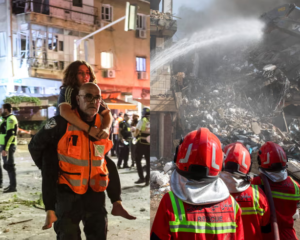
In his inaugural address this January, Donald Trump declared that his proudest legacy would be that of “a peacemaker and unifier”, pledging that US power would “stop all wars and bring a new spirit of unity to a world that has been angry, violent, and totally unpredictable”.
Five months later, his second presidency is witnessing the spectacular unraveling of that lofty aspiration.
A president who vowed to end global conflicts – including one which he said he would resolve within his first 24 hours – has instead presided over their escalation – most recently the spiraling conflict between Israel and Iran.
The timeline of the latest conflict resuggests a stark disconnect between Trump’s aspirations and reality: the wave of Israeli airstrikes came just hours afterTrump urged Israel not to attack Iran.
Marco Rubio, Trump’s secretary of state, took pains to describe the Israeli attack as “unilateral”, stressing that the US was “not involved in strikes against Iran” – only for Trump to then insist he had been well informed of Israel’s plans – and warn that further attacks would be “even more brutal”.
Trump’s Middle East envoy Steve Witkoff, who has emerged as Trump’s primary diplomatic negotiator in the Middle East and Ukraine, still reportedly plans to go to Oman this weekend for talks on Tehran’s nuclear program, but it appeared unlikely the Iranians would attend.
Trump’s muddled peace agenda was already disarray long before Thursday’s attacks.
The Gaza ceasefire his administration helped broker collapsed within weeks, with Israel resuming massive bombardments and imposing a three-month total blockade on humanitarian aid to the territory, where the death toll has now surpassed at least 55,000.
In Ukraine – a conflict Trump once bragged he would end on his first day back in office – Russian forces have pressed ahead with a summer offensive, entering the Dnipropetrovsk region for the first time in three years and accumulating more forces – evidence that Putin has no interest in Trump’s peace overtures and intends to expand the war further.
Meanwhile, Trump’s abrupt announcement of a ceasefire between India and Pakistan was met with fury in New Delhi, where officials denied his claims of brokering the deal.
And while Defense Secretary Pete Hegseth acknowledged to Congress that the Pentagon has developed contingency plans to seize Greenland and Panama militarily, it’s unclear how territorial conquest fits into Trump’s definition of peacemaking.
His first term ended no wars, nearly sparked conflict with Iran, and saw his signature “peace” achievement – the Abraham accords – normalize relations between Israel and countries that weren’t fighting it anyway.
Part of Trump’s appeal to voters was precisely a promise to avoid foreign entanglements. In the stands at the inauguration viewing party, supporters told the Guardian how they valued his restraint in military deployment and favored his America-first approach that prioritized domestic concerns over international aid and intervention. And there is a an argument that for Trump peace is not an absence of conflict but rather Washington’s distance from it.
There is one potentially optimistic interpretation for the latest strikes in Iran. Alex Vatanka, the Iran director from the Middle East Institute in Washington, suggested that Israel’s attack could be a calculated gamble to shock Iran into serious negotiations. The theory holds that Israel convinced Trump to allow limited strikes that would pressure Tehran without triggering regime change, essentially using military action to restart stalled diplomacy. On Friday Trump suggested that the strike on Iran might have even improved the chances of a nuclear agreement.
“This is not likely to bring Iran back to the negotiating table,” said Andrew Borene, executive director of global security at Flashpoint and a former staff officer at the US’s office of the director of national intelligence. “It marks the opening of yet another rapidly expanding flashpoint within the global context of a new hybrid cold war, one that will be fought both on the ground and in the darkest corners of the web.”
Whether this strategy succeeds depends entirely on Iran’s response. The regime could either return to negotiations chastened, or abandon diplomacy altogether and pursue nuclear weapons more aggressively. Early indicators suggest Tehran may not be in a conciliatory mood after having its facilities bombed and leaders killed.
But even if the more optimistic readings prove correct, it does not change the broader reality: every major conflict Trump inherited or promised to resolve has intensified on his watch.
Trump promised to be a peacemaker. Instead, he’s managing multiple wars while his diplomatic initiatives collapse in real time. From Gaza to Ukraine to Iran, the world appears more volatile and dangerous than when he took his oath five months ago.
Understanding what is happening in the Middle East is more important than ever.
It’s the Guardian’s job to decipher this, and with reporters sharing live updates around the clock, we’re well-placed to provide comprehensive, fact-checked reporting, to help us all make sense of the events reshaping global politics. But we can’t do it without your support.
Unlike many others, the Guardian has no shareholders and no billionaire owner bankrolling us. We rely on the generosity of our readers, whose support helps to keep our correspondents on the ground and our reporting free from commercial or political influence.
We appreciate that not everyone can afford to pay for news, but if you can, can we count on your support in this perilous time? Here are three good reasons to make the choice to fund us today:
1. Our quality, investigative journalism is a scrutinising force.
2. We are independent and have no billionaire owner controlling what we do, so your money directly powers our reporting.
3. It doesn’t cost much, and takes less time than it took to read this message.
Choosing to back us on a monthly basis makes the most impact, meaning we can continue to cover the story from every angle: the conflict, the plight of those affected and what it all means for the future of the Middle East – and the world.
https://www.theguardian.com/us-news/2025/jun/14/trump-gaza-ukraine-iran-israel
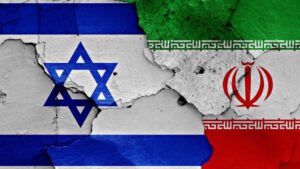
Number of personnel in the armed forces
Air Force and missile defense
Missile and drone arsenal
Intelligence and special forces
Conclusions.
In terms of military power, Iran wins in terms of numbers: soldiers, missiles, drones, and a large fleet. However, Israel has a qualitative advantage: modern fighter jets, missile defense, cyber infrastructure, nuclear capabilities, and innovative technologies. In the event of war, Iran has the resources for a long-term, large-scale campaign, but Israel may be able to deliver a decisive technological blow first, with US support and thanks to its dominance in critical areas.
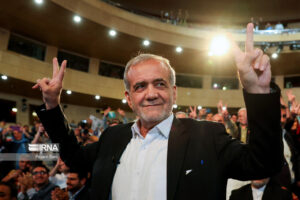
Former Iranian parliament member Masoud Pezeshkian has won Iran’s presidential election, Tasnim news agency reported.
“The second stage of the presidential election was held on Friday, July 5, and according to the results of vote counting, Masoud Pezeshkian was elected president of the Islamic Republic of Iran,” the report said.
The agency noted that such a conclusion was made, “according to the announcement of the election headquarters spokesman, based on the counting of 30 million 530 thousand 157 votes received from all offices inside and outside the country.”
Earlier, the Experts Club think tank presented an analysis of the most important elections in the countries of the world in 2024, more video analysis is available here – https://youtu.be/73DB0GbJy4M?si=eGb95W02MgF6KzXU.
Subscribe to Experts Club’s youtube channel here – https://www.youtube.com/@ExpertsClub